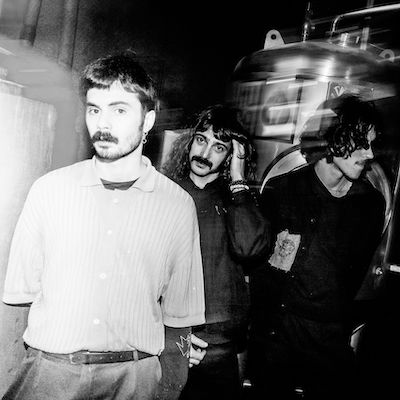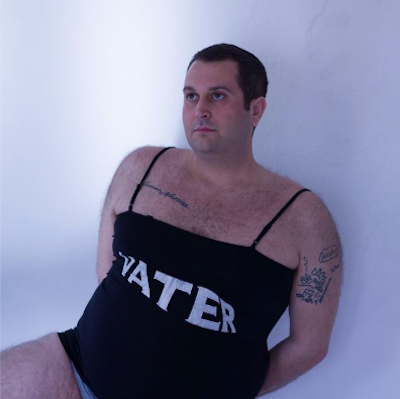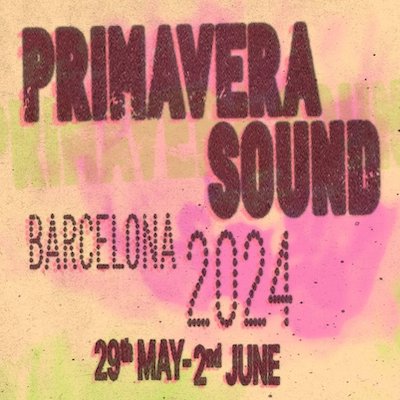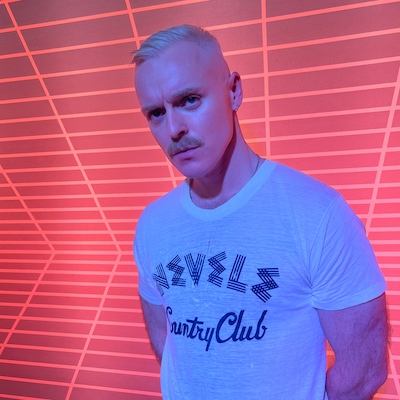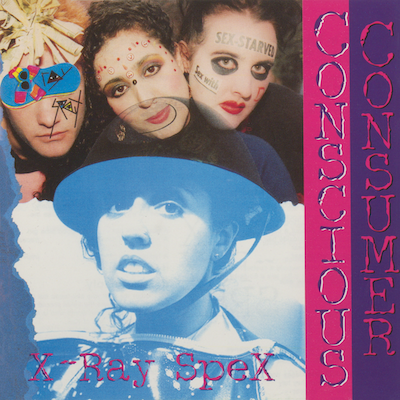
Loverboy Magazine is thrilled to dive into the world of Punk legend Lora Logic, the musician behind the iconic saxophone sound of X-Ray Spex. We’re especially excited to chat with her as the much-anticipated re-issue of X-Ray Spex‘s lost sophomore album, Conscious Consumer, is set to be released on vinyl via Do Yourself In Records for the first time.
This final studio album has been in hibernation for 27 years, making this release a momentous occasion for enthusiasts interested in X-Ray Spex’s unique universe even within punk. Lead singer Poly Styrene stood out as a bi-racial female lead singer critiquing ideas of consumerism, identity and feminism. As we prepare to unravel the mysteries of Conscious Consumer, we asked Loverboy’s George Alley, musician and Punk professor, to converse with Lora about the impact of X-Ray Spex and Lora Logic’s musical legacy.
Lora, it’s so lovely to meet you! When did you start playing the sax?
Where to begin? My mom grew up on a small farm in Finland. No running water, hardly any electricity, it was cows and land and she never had the opportunity to do things like learn musical instruments or go to school until she was 12. She came to England as soon as she could and became an air hostess. Later, when she got married and had kids, she wanted my brother and I to learn musical instruments.
I went through piano and violin, having to learn pieces rote, so I didn’t have much taste for it. But then when I was about 13, I started listening to David Bowie and I asked for a Saxophone, because I thought, ‘There;s no way they’re ever going to buy me a saxophone, they’re way too expensive and it’s just ridiculous, you can’t learn the saxophone in school”. But father’s favorite instrument was the saxophone, and every room of the house would be filled with Stan Getz or John Coltrane. One day, I came home one day from school and there was this beautiful golden saxophone in a box, and it was love at first sight.
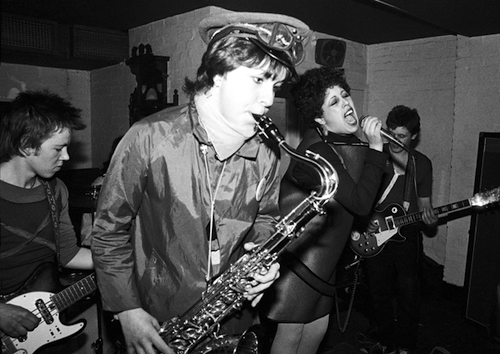
Ian Dickson
Yeah, I liked Roxy Music, I grew up in a glam pop time. Well, I grew up loving musicals. I wanted to be an actress like so many other girls when I was about 11. I went to a ruthlessly academic all-girls school, so any chance to do something different or subversive, I leapt at the chance. But I found that the drama teachers had their pet favourites, and the atmosphere to be quite false and artificial. So, when the saxophone came along, I practised for five hours a day. Then my first advert I saw was X-Ray Spex. The first band that I joined was X-Ray Spex, when I was 15. The few adverts in the back of three music papers, which were Sounds, NME, or Melody Maker.
One week, I saw this advert in Melody Maker saying ‘Young punks wanted.’ I had no idea what the word ‘punks’ meant, but it sounded good, so I rang up. It was literally the first advert I answered. I turned up and didn’t play a note, they weren’t really interested in whether I could play or not. The manager Falcon thought it would be ‘far out’ to have two young girls together but he had other motives. While it worked it was a dream come true for me, obviously, at the age of 15, to be in a band like X-Ray Spex and to be part of a revolutionary punk rock movement in those early days. It was probably the best musical training I could have got; training for life.
How far along were the band when you joined them?
Oh, it was right in the beginning, I think Jack was there and I was there. Paul, the bass player, hadn’t come yet, and they were trying other drummers and other bass players. The first drummer was Rich T, who ended up being the drummer for three years in Essential Logic, the band, which I formed after X-Ray Spex. But he had to go because his hair was too long and he refused to have it cut.
Speaking of hair, I read a story about Poly cutting your hair without asking.
Yeah, yeah, she tried to cut everybody’s hair. Unexpectedly, in a rehearsal, she just pulled this huge pair of scissors out, kitchen scissors, and she says, ‘But you can’t go on stage like that, with hair.’ But she kept her hair, which I thought was very unfair.
Wow! I am also surprised that the advert said ‘Young punks’ at that time. So were Poly and manager Falcon Stuart conscious of the ethos of punk in ‘76?
It was just beginning, there were a few hubs around London, where bands like The Pistols and The Clash were coming together. It was more like a mood, it was waiting to happen. The minute that clubs opened where punks from all over the UK and even Europe could come together. It was a mad dash, like a Black Friday sale. They intuitively knew it was going to happen before it happened. It was surreal those early months of punk, the beginning of 1978 while Andy Czezowski’s Roxy Club was open; specifically, those four months. Some people say ‘the end of punk rock’ was when that club closed because then it became so commercialized but back then it was a hub, just like probably similar in New York, where they had CBGBs.
At the Roxy, what music was being played? I know most ‘punk music’ hadn’t been pressed onto vinyl yet.
Yeah, Don Letts did a lot of DJing Roots Reggae at the Roxy. That’s the thing I remember the most, the reggae sound. Also rock’n’roll in the ‘50s [for the Teds], Bill Haley & the Comets had saxophone that the Ted’s liked. So there was the Punks and the Teds; that was the music that was around.
What was your interaction with other women in the scene at that time, like Debbie Harry or Siouxsie or The Slits or The Raincoats? Was there much communication between you and other women?
Well, the Roxy was just sort of like a lore unto its own. It was it was a bit like the Rat Pack and there were so many bands every night, so many different bands playing there. I remember from my personal memories; the Slits were playing with X-Ray Spex one night and Ari Up was very young as well. She was 14 or 15, a character and she was naughty. She pulled the plug out right before Polly went on. So when Polly went on, there was no power. Polly wanted to kill her. I don’t think Polly and Ari Up were best friends. Polly really liked John Lydon. We were quite busy musically so I don’t remember the Spex ever hanging out with any other band. I didn’t realize at the time, but maybe Falcon, the manager, wanted to keep us kind of in our own bubble separate because he was a very ambitious and not always in a good way for X-Ray Spex.
With ‘Oh Bondage Up Yours!’ How did the process for that song come about?
Well, pretty much the same as all of the X-Ray Spex set, which was Poly had a melody and she had some words, and usually she worked that out with Jack the guitarist. He’d get some chords and then we’d just start playing, and then I’d just play sax on top of that. But Bondage in particular, the riff actually had very little relevance to the rest of the song. And to this day, I don’t know why I played that riff on that song, but it stuck. It was just the melody I heard in my head. It was very anarchic and there was no rules, there was no categories, there was no genres, and I’d never been in a band before, and I’d never arranged anybody else’s songs before, I’d only played along to records I’d heard. I arranged all the sax riffs for those songs, and of course I left the band before they got recorded.
What transpired to cause you to not be there for the recording of X-Ray Spex’s debut album, Germ-Free Adolescents?
When I first met Poly, we were best friends the minute she opened the door, we were even wearing the same clothes as each other. We were both wearing these 1950s granny suits when I knocked on her door for the first time. She had an infectious bubbly laugh. We thought of the name, X-Ray Spex together, we did a lot of things together dressed up from her market stall on the King’s Road. We enjoyed shocking people on the top of red double-decker buses with our DayGlo baskets full of plastic animals.
Bondage had been released, there had been one article in Sounds newspaper by a journalist called Jane Suck, who’d said that she thought that the ‘sax sound’ was X-Ray Spex. Anyway, Poly read it and it freaked her out, and became a turning point where she started to see me as a threat and a rival because I was getting attention. I didn’t realize at the time, but she didn’t want another girl in the band.
I didn’t hear from Polly or the manager after that review for six weeks. I thought it was strange as we were gigging all the time. I rang him up one day and he just said, ‘Oh didn’t you know we found another sax player?’ I thought, ‘What?’ It was so cruel and heartless. ‘It was for the sake of the band. You had to go,’ he said. My little world was smashed…that’s the way it was broken to me.
After that I put my sax away. I didn’t follow up on what happened to the band. My mom told me one day, ‘It was on frontpage headlines somewhere that Poly had seen a flying saucer and a spaceship.’ I disengaged with music business, and went to art school for one term, which is where I was approached to record a single of my own, ‘Aerosol Burns’.
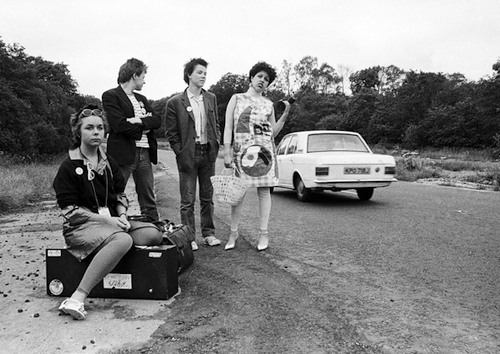
Ian Dickson
Yeah, there was a chap called Jeff Mann, and he had his own independent record label, but he hadn’t released anything on it. But somehow he tracked me down. I was Susan Whitby; I forgot about Lora Logic. He said, ‘Would you like to make your own record? You were the best thing about X-Ray Spex. I can put you in a studio.’ I just kept telling him, I didn’t have any songs, I’d never written a song in my life. But he kept pursuing it and waiting outside the art school.
Meanwhile, I was rapidly losing interest in the art school, it was a ghost town, everyone was snorting cocaine at lunchtimes. So I found Tim Wright and Stuart Action, who had been fans of X-Ray Spex, went to my mum’s house and wrote Aerosol Burns in half an hour. It was supposed to be tongue in cheek, almost like a spoof of X-Ray Spex. We’d hardly rehearsed it. And I found Rich T, who had also been kicked out of X-Ray Spex, so we had that in common. We were the X-Ray Spex kickouts!
There are some themes in ‘Aerosol Burns’, obviously referencing X-Ray Spex, but there are themes in most of your work that dialogue about consumerism. Was ‘Aerosol Burns’ only just a way to spoof some of the lyrics from X-Ray Spex?
No. I don’t know if you’ve heard my last album, Land of Kali, but yeah, I’ve never written just plain love songs. I guess Poly and I, although we had this strange karma throughout our lives together, I guess we’re on similar channels in terms of the way we thought about the world or similar processing channels. I loved her lyrics so much, also we spent some time living together in the Krishna community and being very affected by the teachings of the Bhagavad Gita, which deal with many of the topics that she wrote about, especially “Conscious Consumer.”
How did you end up living at the temple in Soho with the Krishna community?
I was in the middle of recording my solo album (Pedigree Charm), which took quite a while to record because we made it ourselves on an 8-track tape machine with Phil, Charlie Haywood and Ben Annesley. But in the middle of that, I was going through my own personal meltdown, that culminated in an epileptic fit because I’d been smoking too much weed in some Rasta’s house in Brixton. I ended up on a wooden bed upstairs. My body had propelled across the floor. They’d carried me upstairs and I had this out-of-body experience, and I was looking down on my body.
I had been visiting the Krishna temple because I’d seen my ex best friend at school on the street dressed up in Krishna clothes, a sari and Ganges clay on her forehead almost jumping out of her skin chanting ‘Hare Krishna’ on the streets and looking incredibly happy I thought, ‘I have to go and visit her because she’s joined a mad cult in London.’ But the minute that I walked through the temple door, I just loved it. I liked the smells and the food and the philosophy and the people, who seemed genuinely high without taking anything.
So, during the fit I started praying to Krishna. And I just said, ‘Krishna, please, if you put me back in my body, I’ll clean my act up and I’ll try to do something useful with my life.’ And I did, I recovered but it was a game-changer for me. So at the end of recording Pedigree Charm, I just thought, ‘I need a break.’ I’d been living in squats for three and a half years, hadn’t been drinking water or eating fruit. I had very bad bronchitis bouts. I needed a change.
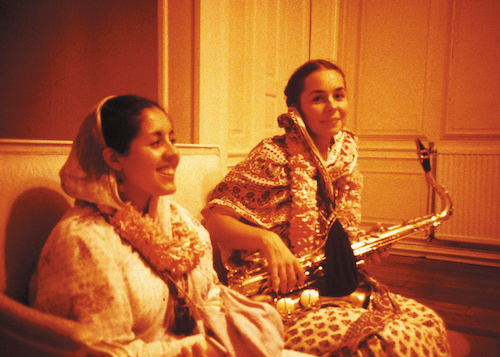
The Poly Styrene Estate
Well, yeah Boy George just wandered into the temple one day. He had some good Krishna friends and he’d been to India. I’d never actually met him personally before that and I was just living my temple life at that point. I was in a sari and I remember hearing all this giggling coming up the stairs. One of the resident monks was escorting him upstairs the door was left open, and I saw Boy George go in there with Philip Sallon. And they were laughing and laughing.
Then a few weeks later, ‘Bow Down Mister’ was recorded. A group of devotees was asked to go and sing with George on Top of the Pops, and we did Parkinson’s Show, and a Michael Asbo Show. I love the way that the gospel is incorporated with the Krishna chorus, it’s such a lovely song, I love the words and everything about it. I live near George Harrison’s temple, the Manor and (Boy) George comes there sometimes and sings; of course, everybody loves him.
How did you reconnect with Polly in the 90’s to write the soon-to-be reissued X-Ray Spex sophomore album Conscious Consumer?
It was a surprise, because I spoke to Polly on and off over the years, there’d be long gaps and I lived in India for a few years. She called me one day, said that she was going to record a new album, would I like to come and stay with her in her little London flat and play sax on it. Typical Polly, it was about five days’ notice and my child was 4 at the time. Luckily, I was able to find childcare and jumped on the train with my tenor sax, which I hadn’t played for a long time.
Were you nervous to work with her again or were you excited…
I wasn’t nervous about the music, I knew that would be fabulous, especially when I heard that Crispin was playing guitar and Paul Dean was on bass. I was nervous about staying with her in a flat with her history. But I thought if she’s hired a studio and she’s got an engineer and a producer and these other people are working with her, it should be okay. I just kind of jumped in and took the risk.
The subject matter in those songs on Conscious Consumer, feel relevant today. Talking about mass consumerism in the song ‘Cigarettes’ or identity and expectations of women in ‘Good Time Girl’. What’s your experience in revisiting the Spex material from 1995 to reissue this vinyl?
It’s been amazing. We had spent so much time carefully making the album and then she lost her health. The bipolar kicked in towards the end of recording and it was really a miracle that it got finished. She couldn’t promote it or do interviews, and the record company lost faith and nothing really happened, it was sad.
It’s wonderful to see it come to light now and so beautifully presented. The remasters I think are even better than the original. Pagan Davis has overseen this project on Do Yourself In Records. Polly’s original artwork has been retained. I think it’s like a twin album in many ways to Germ Free Adolescents. I think there are a lot of similarities between the two, it’s very much a second X-Ray Spex album.
But it’s not the same. The songs feel like they’re pushing X-Ray Spex musically to a new space. The songs breathe.
I think that has got to do with Crispin’s (Mills of Kula Shaker) guitar arrangements. He is a different guitarist to Jak (Airport). Jak’s playing was more simple, more punchy, more punk if you like, more to the point. Whereas Crispin is a more sophisticated guitarist. There’s more musical interludes on Conscious Consumer. I think it’s more sophisticated musically. Polly told me when we were recording it that she wanted to make it a little bit Blondie and songs like maybe ‘Junk Food Junkie’ and ‘Good Time Girl’ have got the pop gloss on it.
I know that with your last album (The Life of Kali) you’ve been doing a lot of home recording and then you’ve been sending things off to (producer) Youth; what’s been your musical process lately?
I was asked to put saxophone on, funnily enough, a Christmas song which Polly sang. It was one of the last things she ever recorded. We’re hoping it will be released for Christmas. It was a duet between John Robb and Polly released for the first time 10, 15 years ago. I have enjoyed doing as it’s quite an unusual song. I’ve heard through the grapevine that Youth might be producing it as well.
Loverboy magazine is named after the famed Mariah Carey hit. Do you know of any songs by Mariah Carey that you like?
Oh, this is where I reveal my ignorance because I went for decades without listening to any modern music. My daughter plays Mariah Carey, I would imagine as she’s 20. I know she has an exquisite, heavenly voice. These days I like silence and I don’t listen to a lot of other music unless it’s related to maybe something that’s on my mind.
Conscious Consumer is available to buy on CD and Vinyl now via Do Yourself In Records.



